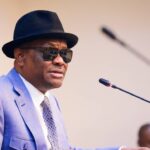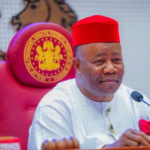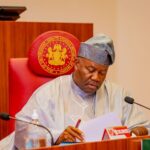On June 13, 2024, the 10th National Assembly spent one year, devoid of positive colour and remarkable soundbite, in carrying out its three main functions of making laws, providing oversight functions on the executive and judiciary, and in examining and approving the national budget. Both the Upper Chamber, presided over by Senator Godswill Akpabio, and the Lower Chamber, superintended by Speaker Abass Tajudeen, failed to rise to the challenge of debating, projecting and enhancing the well-being of Nigerians whom they represent in the hallowed chambers of the National Assembly. Rather, in the last 12 months, the most outstanding issues from the lawmakers were the outrageous appropriation of N344.85 billion for the National Assembly and the purchase of N160 million worth of vehicles for each lawmaker, in spite of the wide outcry against such insensitive expenditure.
The Senate Leader, Senator Opeyemi Bamidele, however, had a flowery assessment of the Upper Chamber’s performance, outlining the passage of 25 bills out of 477 introduced, and the deliberations that produced as many as 115 resolutions, which he said contributed to economic development and nation building. Senator Akpabio also listed the bills passed to include the South East Development Bill, Northern Development Bill, Old National Anthem Bill and Death Penalty for Drug Traffickers Bill. He said that: “With remarkable efficiency, we swiftly approved the 2024 Appropriation Bill in record time, setting the stage for the timely implementation of the budget. We championed the South East Development Bill and the North West Development Bill. Bridging the gap between our glorious past and our inspiring future, we dug into our history and restored the treasurable old National Anthem in the National Anthem Bill.
“Naturally, we also took legislative actions that not only reshaped our socio-political landscape, but will reverberate through the corridors of time, benefiting our future generations.”
On the part of the House of Representatives, the House spokesperson, Phillip Agbese, said: “The House has become a beacon of hope for Nigerians, and a symbol of what can be achieved through collective effort and dedication. Under Abbas’ leadership, the House has passed several notable bills. In fact, in the first six months, 120 bills passed the second reading stage. Through these bills, the House is empowering our citizens, enhancing social justice, promoting economic growth, and promoting peace and security.”
- UniAbuja suffered setback for 5 years – ASUU
- NIGERIA DAILY: Sokoto State Government’s Intentions For The Sultan
It is understandable that the ruling All Progressives Congress (APC) has more members in the 10th National Assembly, so the lawmakers may tend to pander to the wishes of the executive. But the constitution envisages that the legislature should maintain visible independence and hold the executive and the judiciary accountable to the Nigerian public, under the principles of checks and balances and the separation of powers. The issues raised by Civil Society Organisations (CSOs) and some members of the National Assembly proved that the lawmakers did a wishy-washy job on the 2024 Appropriation Bill, without critically examining the draft budget from the executive before passing it into law. Though Senator Akpabio counted the speedy approval of the budget as an achievement, other Nigerians pointedly said it proved that the 10th National Assembly had, in handling the Appropriation Bill, borrowed the Rubber Stamp of the 9th National Assembly, which approved every request presented to it by former President Muhammadu Buhari. The assumption that the executive is infallible is unfounded under a democratic system; this National Assembly must repent from such deposition and function as an effective check on the executive.
Apart from not critically examining executive bills, the 10th National Assembly, in the last one year, did not take matters of national importance seriously. Nigerians did not feel the intervention of the lawmakers on the devastating inflation that has wiped away the purchasing power of the people and rendered them incapable of meeting their basic needs. The cost of food items, fuel, and transportation went beyond the fears of the people, but the National Assembly did not lift a finger to challenge the executive, which churned out adverse policies without recourse to their effects on the people.
They have maintained the same attitude towards other national issues, like the minimum wage negotiation between labour and the government, in which the National Assembly has remained akimbo, without taking a definitive position on the side of the Nigerian worker. When the violent crisis in the Okuoma community in Delta State erupted in March this year, the National Assembly did not engage in any meaningful investigation to provide a solution or mediation in the crisis. The same attitude was demonstrated towards the massive oil theft, meningitis and cholera outbreaks, police recruitment saga, unemployment, and the mass escape of youths and experts from Nigeria to just any other part of the world.
As the 10th National Assembly begins another legislative year, we call on the lawmakers to prioritise issues that affect Nigerians, instead of being subservient to the whims and caprices of the executive. In every responsive democracy, the legislature prioritises the welfare and security of the people that vote them into power. The situation must not be different in Nigeria.

 Join Daily Trust WhatsApp Community For Quick Access To News and Happenings Around You.
Join Daily Trust WhatsApp Community For Quick Access To News and Happenings Around You.


